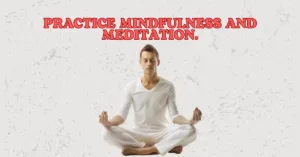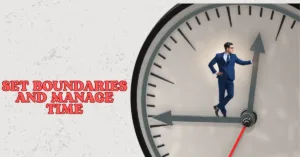
7 Self-Care and Stress Management Techniques
- 111
- 0
- 0
Self-care and stress management techniques are crucial for maintaining a healthy and balanced life. Taking time for self-care helps prevent burnout, boosts mental and physical health, and improves overall well-being. Managing stress effectively reduces the risk of chronic health issues like anxiety, depression, and heart disease. It also enhances productivity, focus, and emotional resilience, enabling better decision-making and stronger relationships. Prioritizing self-care and stress management is essential for sustaining long-term happiness and leading a more fulfilling, purposeful life.
7 Self-Care and Stress Management Techniques
In today’s fast-paced world, stress is a frequent challenge that affects many of us, impacting both our mental and physical well-being. Balancing work, personal life, and other responsibilities can leave us feeling overwhelmed. Prioritizing self-care and effective stress management is crucial for maintaining our well-being and overall health. Here are seven self-care and stress management techniques and take better care of yourself.
Practice Mindfulness and Meditation

Mindfulness and meditation are powerful techniques for lowering stress and enhancing mental clarity. Mindfulness requires concentrating on the present moment and noticing your thoughts and emotions without criticism. Meditation takes this a step further by providing a structured way to calm your mind and body. It is one of the best self-care and stress management techniques.
How to Get Started:
- Find a peaceful place where you can sit calmly
- Close your eyes and take deep, slow breaths.
- Concentrate on your breathing practice or a simple mantra.
- Start with just a few minutes each day and slowly improve the time as you get better pleased.
Benefits:
- Reduces anxiety and stress.
- Improves concentration and mental clarity.
- Enhances emotional well-being.
Engage in Regular Physical Activity

Exercise is a powerful tool for managing stress. Exercise triggers the release of endorphins, brain chemicals that function as natural pain relievers and boost your mood. Regular exercise also helps improve sleep and boost self-esteem.
How to Incorporate Exercise:
Pick activities you love, like walking, running, cycling, or practicing yoga.
- Pick activities you love, like walking, running, cycling, or practicing yoga.
- Strive for at least 30 minutes of moderate exercise on most days of the week.
- Think about joining a fitness class or group to help keep yourself motivated.
Benefits:
- Boosts mood and energy levels.
- Improves sleep quality.
- Enhances overall physical health.
Maintain a Balanced Diet

Your diet can greatly influence your stress levels and overall health. A balanced diet provides your body with essential nutrients and helps regulate mood and energy levels. It is one of the best self-care and stress management techniques.
Tips for a Healthy Diet:
- Include a variety of fruits and vegetables in your meals.
- Choose whole grains and lean proteins.
- Limit your intake of caffeine, sugar, and processed foods.
- Stay hydrated by drinking plenty of water throughout the day.
Benefits:
- Supports physical and mental health.
- Helps stabilize energy levels.
- Reduces the risk of stress-related health issues.
Get Enough Sleep

Getting enough sleep is crucial for handling stress and ensuring overall health. Lack of sleep can increase stress levels, impair cognitive function, and affect your mood.
Tips for Better Sleep:
- Maintain a consistent sleep routine by going to bed and waking up at the same times each day.
- Establish a soothing bedtime routine, like reading a book or enjoying a warm bath.
- Make your sleep environment comfortable and free from distractions like electronic devices.
Benefits:
- Enhances cognitive function and mood.
- Improves physical health and energy levels.
- Helps the body recover and repair.
Connect with Others

Building social connections is crucial for effectively managing stress. Talking to friends, family, or a support group can provide comfort, perspective, and a sense of belonging. It is one of the best self-care and stress management techniques.
Ways to Build Connections:
- Schedule regular catch-ups with friends or family.
- Join social or community groups based on your interests.
- If necessary, aim for support from a therapist or a counselor.
Benefits:
- Provides emotional support and understanding.
- Reduces feelings of isolation and loneliness.
- Offers practical advice and coping strategies.
Set Boundaries and Manage Time

Effective time management and setting boundaries can help reduce stress by preventing overload and ensuring that you have time for self-care and relaxation. It is one of the best self-care and stress management techniques.
How to Manage Time and Set Boundaries:
- Prioritize tasks and set realistic goals.
- Divide tasks into smaller, manageable steps and delegate them when you can.
- Know when to say no to prevent taking on too many commitments.
Benefits:
- Reduces feelings of overwhelm and burnout.
- Helps maintain a healthy work-life balance.
- Increases productivity and focus.
Engage in Relaxing Hobbies

Participating in hobbies and activities you enjoy can be a great way to relieve stress and boost your mood. Hobbies provide a break from daily pressures and give you a chance to unwind.
Ideas for Relaxing Hobbies:
- Read a book or listen to music.
- Try creative activities like painting, gardening, or cooking.
- Use relaxation methods like deep breathing or progressive muscle relaxation to help manage stress.
Benefits:
- Provides a sense of accomplishment and joy.
- Offers a distraction from stressors.
- Enhances overall well-being and satisfaction.
Conclusion
Managing stress and practicing self-care are essential for maintaining a healthy and balanced life. By incorporating these seven techniques—mindfulness and meditation, regular exercise, a balanced diet, adequate sleep, social connections, effective time management, and relaxing hobbies—you can better handle stress and improve your overall quality of life.
Remember, self-care is not a luxury but a necessity. Taking time for yourself helps you stay resilient and better equipped to face life’s challenges. Start integrating these practices into your daily routine and observe the positive changes in your stress levels and overall well-being.
FAQs
1. What is self-care?
Self-care means taking time to do activities that improve your physical, mental, and emotional health, like exercising, eating well, or relaxing.
2. Why is stress management important?
Managing stress is important because it helps prevent health problems, improves focus, and allows you to handle life’s challenges more effectively.
3. How can I manage stress daily?
You can manage stress daily by practicing deep breathing, exercising, getting enough sleep, and taking breaks to relax and recharge.
4. What are some easy self-care activities?
Easy self-care activities include taking a walk, reading a book, listening to music, or enjoying a hobby you love.
5. How often should I practice self-care?
Practice self-care regularly, even daily if possible, to maintain your well-being and keep stress levels under control.
Also Read:
How to Battle Stress: 10 Guides to Finding Calm in a Busy World
7 Self-care Ideas for Moms
References:
https://www.ncbi.nlm.nih.gov/pmc/articles/PMC7349817/
https://pubmed.ncbi.nlm.nih.gov/30020672/
https://www.ncbi.nlm.nih.gov/pmc/articles/PMC5319270/
Disclaimer: The self-care and stress management techniques provided in this blog are for informational purposes only. They are not a substitute for professional mental health advice. Please consult a qualified therapist or healthcare provider for personalized support.
Related post

7 Health Benefits of Assam Tea


